Pauline Yvonne Parker (May 26, 1938)
[currently Hilary Nathan]
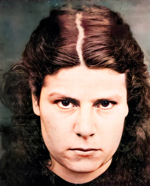 Pauline was born on May 26, 1938 in Christchurch, NZ, as third child of Herbert Detlev Rieper (aged 43) and Honorah Mary Parker (aged 29). As a young child of five, Pauline contracted osteomyelitis and was hospitalized for nine months. She was near death at one point, and the illness and treatment were extremely painful for her. Little Pauline was reported to have borne the pain bravely and quietly. Two years later, at the age of seven, she was forced to undergo a second painful operation to drain infection from her leg. Pauline's illness left her with a permanent, though not crippling, handicap which would excuse her from physical education and sports throughout childhood. Pauline had chronic, recurring pain in her leg throughout her childhood and youth and she took pain killers quite frequently throughout this time. Otherwise, her childhood was described by her father as "uneventful." She attended a local primary school but had to be in a class by herself for nearly two years following her discharge from hospital because of the school's organization.
Pauline was born on May 26, 1938 in Christchurch, NZ, as third child of Herbert Detlev Rieper (aged 43) and Honorah Mary Parker (aged 29). As a young child of five, Pauline contracted osteomyelitis and was hospitalized for nine months. She was near death at one point, and the illness and treatment were extremely painful for her. Little Pauline was reported to have borne the pain bravely and quietly. Two years later, at the age of seven, she was forced to undergo a second painful operation to drain infection from her leg. Pauline's illness left her with a permanent, though not crippling, handicap which would excuse her from physical education and sports throughout childhood. Pauline had chronic, recurring pain in her leg throughout her childhood and youth and she took pain killers quite frequently throughout this time. Otherwise, her childhood was described by her father as "uneventful." She attended a local primary school but had to be in a class by herself for nearly two years following her discharge from hospital because of the school's organization.
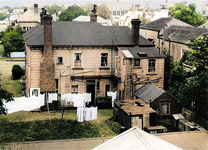
Pauline was eight when her family moved to 31 Gloucester Steet, in downtown Christchurch. The house was later described by her classmates as a gloomy, rambling house, known to some pupils as “the house with the rusty roof”.
The house backed onto the Christchurch Girls' High School - their garden overlooked the grounds of CGHS over the rear fence. One block to the south was Canterbury University college.

 Throughout much of her later childhood, Pauline attended East Belt Methodist Church regularly with her sister, Wendy, though her parents were not regular parishoners. She and her sister went on outings and vacations in the country sponsored by the Church. Pauline was described as a serious, mature, bright girl and an imaginitive, gifted writer. She became interested in creative modelling in plasticine and wood and became quite accomplished. Upon entering Christchurch Girls High School in February 1952, at the age of 12, Pauline was placed into the top stream. Note that Pauline entered High School at the normal age, despite having been hospitalized for the better part of a year.
Throughout much of her later childhood, Pauline attended East Belt Methodist Church regularly with her sister, Wendy, though her parents were not regular parishoners. She and her sister went on outings and vacations in the country sponsored by the Church. Pauline was described as a serious, mature, bright girl and an imaginitive, gifted writer. She became interested in creative modelling in plasticine and wood and became quite accomplished. Upon entering Christchurch Girls High School in February 1952, at the age of 12, Pauline was placed into the top stream. Note that Pauline entered High School at the normal age, despite having been hospitalized for the better part of a year.
Enter Juliet
 Soon after Juliet Hulme began attending Girls' High, Pauline Parker - who went by the name 'Paul' at school - began a friendship with Juliet that would come to distance Pauline from her family. The friendship between the two girls was also to push the bounds of local social norms in many ways; their physical closeness at school was disapproved of and commented on as early as mid-1952. Glamuzina and Laurie portray Pauline's family, in particular, as becoming progressively more concerned at the growing friendship between Pauline and Juliet, disapproving of the changes they saw in Pauline and in her behaviour and her attitudes as the friendship grew.
Soon after Juliet Hulme began attending Girls' High, Pauline Parker - who went by the name 'Paul' at school - began a friendship with Juliet that would come to distance Pauline from her family. The friendship between the two girls was also to push the bounds of local social norms in many ways; their physical closeness at school was disapproved of and commented on as early as mid-1952. Glamuzina and Laurie portray Pauline's family, in particular, as becoming progressively more concerned at the growing friendship between Pauline and Juliet, disapproving of the changes they saw in Pauline and in her behaviour and her attitudes as the friendship grew.
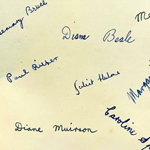
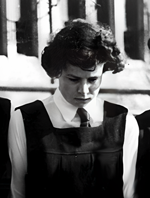 The two girls were separated for the first time by Juliet's quarantine in the TB sanatorium. Pauline Parker was a loyal, loving and extremely important friend to Juliet during this very difficult time in Juliet's life. In later years, Juliet Hulme would comment that she would come to feel an extreme debt of gratitude and obligation to Pauline Parker because of Pauline's unwavering support and companionship during this "dark and lonely time." Juliet would refer to Pauline's friendship as a "lifeline" during her confinement at the sanatorium.
The two girls were separated for the first time by Juliet's quarantine in the TB sanatorium. Pauline Parker was a loyal, loving and extremely important friend to Juliet during this very difficult time in Juliet's life. In later years, Juliet Hulme would comment that she would come to feel an extreme debt of gratitude and obligation to Pauline Parker because of Pauline's unwavering support and companionship during this "dark and lonely time." Juliet would refer to Pauline's friendship as a "lifeline" during her confinement at the sanatorium.
Pauline wrote extensively during this time, in the form of letters to Juliet, stories and in personal diaries beginning in January, 1953. Pauline's diaries would eventually provide most of the physical evidence for premeditation of Honorah Parker's murder. They would also be used extensively by the army of psychiatrists in their testimony during the trial. Glamuzina and Laurie claim that much of Pauline's diaries have been sensationalized and mis-interpreted.
Pauline's school picture from October 1953 shows her to be a serious, rather short, dark-haired girl with an oval face and full, dark brows. At "seven stone" (98 lbs / 45 kg) she appears slim compared to her classmates and rather more sad than brooding, with arms held quite stiffly behind her and her face downcast. Her hair is dark and had been curled and pinned on either side of her head, a little untidily. All the girls around her have short hair styles. Pauline's uniform is well-fitting, neat and pressed, her collar starched, and her tie is loosely but correctly knotted and placed.
Gear up for murder
When the Hulme family started disintegrating, Pauline became concerned and upset at first, according to her diary. Pauline had formed a close relationship with Hilda Hulme before this upheaval, or perhaps a close attachment would be a more correct description, according to her diaries. Pauline had apparently believed that Hilda and Henry Hulme would support her in her desire to leave her family for theirs. The Hulme family upheaval changed all that, and it seems that Pauline and Juliet came up with several alternative 'escape' schemes.Honorah Parker was apparently pleased that the relationship between the girls would be broken up and she became very pleased when she learned that Dr Hulme was to leave the country, with Juliet, according to evidence presented during the trial. Around this time Honorah removed her daughter from school and enrolled her at Digby's Commercial College. According to Glamuzina and Laurie, "Suggestions were made that she had fallen behind in her schoolwork [when she left the High School]. The school record shows no indication of this".
 Just 12 days before the Hulme household was due to disintegrate completely, Pauline Parker murdered her mother, with Juliet Hulme's assistance, on Tuesday June 22, 1954. The girls led Ms. Rieper to a remote area of a park near Christchurch and beat her to death with a half brick concealed in a stocking. They immediately ran to a nearby tea shop, visibly upset and covered in blood, claiming that Pauline's mother had slipped and fallen. When the body was discovered by police, their story did not hold up in explaining the 45 wounds on the woman's head. The torn, blood-soaked stocking with the brick in it was found nearby. At first, both girls maintained that Honorah Parker's death had been an accident, but Pauline confessed to the crime later that evening when she was interrogated, alone, at Ilam.
Just 12 days before the Hulme household was due to disintegrate completely, Pauline Parker murdered her mother, with Juliet Hulme's assistance, on Tuesday June 22, 1954. The girls led Ms. Rieper to a remote area of a park near Christchurch and beat her to death with a half brick concealed in a stocking. They immediately ran to a nearby tea shop, visibly upset and covered in blood, claiming that Pauline's mother had slipped and fallen. When the body was discovered by police, their story did not hold up in explaining the 45 wounds on the woman's head. The torn, blood-soaked stocking with the brick in it was found nearby. At first, both girls maintained that Honorah Parker's death had been an accident, but Pauline confessed to the crime later that evening when she was interrogated, alone, at Ilam.
She apparently planned to exonerate Juliet, hoping that Juliet would escape punishment, but it was in vain. After making her brief, rather uninformative confession, Pauline Parker offered little more concrete information about the murder in the weeks and months ahead, or her reason for committing it, and she has kept her silence on these matters to this day. She admitted, during questioning, that she was aware of her crime and that it went against the moral standards of the community--sufficient evidence to find her legally sane.
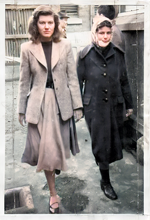
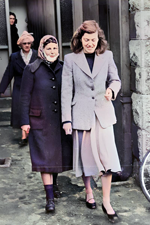
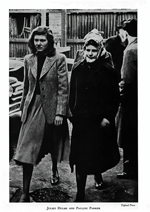 Prior to the trial, Pauline Parker had been known as Pauline Rieper. Her mother, Honorah Rieper, had been living with her father, Herbert Rieper, but during police investigations, it was revealed that they were not, in fact, married. Thus, during the trial, both Honorah and Pauline were referred to with the "Parker" surname.
Prior to the trial, Pauline Parker had been known as Pauline Rieper. Her mother, Honorah Rieper, had been living with her father, Herbert Rieper, but during police investigations, it was revealed that they were not, in fact, married. Thus, during the trial, both Honorah and Pauline were referred to with the "Parker" surname.
A lot of people have wondered: 'What is on Pauline’s chin?'
See 'Mysteries' section for the definitive answer.
at Her Majesty's pleasure
 Parker and Hulme were tried by jury in Christchurch, and were found guilty. A plea of insanity was rejected by the court. As the girls were too young to be considered for the death penalty under New Zealand law at the time, they were convicted and sentenced to be detained at Her Majesty's pleasure. In practice, this sentence meant they were to be detained at the discretion of the Minister of Justice.
Parker and Hulme were tried by jury in Christchurch, and were found guilty. A plea of insanity was rejected by the court. As the girls were too young to be considered for the death penalty under New Zealand law at the time, they were convicted and sentenced to be detained at Her Majesty's pleasure. In practice, this sentence meant they were to be detained at the discretion of the Minister of Justice.
Pauline was removed to a Borstal (roughly equivalent to lower-security Juvenile Detention) near Wellington, Arohata Women's Reformatory, where she served out most of her sentence. This more lenient environment, compared to Mt Eden, was partly the result of lack of prison facilities in New Zealand and also because Pauline was viewed by the public, after the trial, to be slightly the dupe or victim of Juliet Hulme's intense persuasion. The public perceived the murder, for reasons best known to itself, to have been something of a 'thrill killing' in some respects, possibly at Juliet's instigation. There may have also been a little racism and English backlash involved in these sentiments, too. Pauline and Juliet were not allowed to communicate in any way or meet during their incarceration. It was reported that Pauline was extremely distraut by these circumstances in the early stages of her prison term.
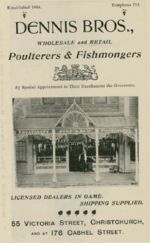 Pauline Parker's relationship with her family members was extremely strained after the murder, as might be expected. Her father was not present at her conviction or sentencing and he made brief and bitter statements to the Press after the trial and upon his daughter's release from prison. Pauline was visited once by her father in prison and it would appear that this was their last contact.
Pauline Parker's relationship with her family members was extremely strained after the murder, as might be expected. Her father was not present at her conviction or sentencing and he made brief and bitter statements to the Press after the trial and upon his daughter's release from prison. Pauline was visited once by her father in prison and it would appear that this was their last contact. Her sister Wendy, just 11 months older than Pauline: "I had to decide if I would hate her for the rest of my life because she took my mother away from me. It was the worst thing that could ever have happened to me. Because we'd been so close growing up, I wrote to her and said, 'I can't believe what's happened. I don't want to accept this.' Pauline wrote back and said, "It just all got out of hand. I don't know what happened and I just want to keep in touch with you."
Pauline was moved to Christchurch Womens' Prison, Paparua before Juliet was moved to Arohata in the later stages of her incarceration. She was visited by other family and friends when she was moved back to Christchurch.
Early in her incarceration Pauline converted to Roman Catholicism and apparently became a devout Catholic. Pauline enrolled in courses in English, French, Latin, Mathematics, Drawing and Design and, later, Maori (perhaps the last choice suggests she was not at that stage expecting to leave her country). She completed University Entrance and made considerable progress towards her Bachelor of Arts degree, eventually completing it soon after her release from prison.
Hilary Nathan
In late 1959, Pauline Parker was furnished with a new identity under the name Hilary Nathan. She was released on parole on November 29, two weeks after Juliet Hulme had been released and had left the country. During her parole, she was subject to controls in terms of her movements and her employment and she was closely monitored. She would have to comply with any directives given her by the Department of Justice. If she failed to meet Department requirements, she could have been recalled to prison to resume her sentence in custody. Department officials noted their concern over Hilary's association with lesbians during her probation period, a good indication of the scrutiny under which she was placed. It also illustrates the type of official labelling, discrimination and repercussions in this timeperiod.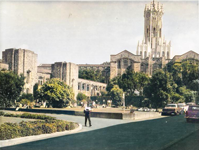
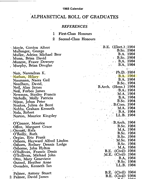 After her release from prison Hilary studied at Auckland University, supporting herself with manual work, which included washing bottles in a hospital. In 1960 she began an affair with a female co-worker, which caused her probation officer some concern. She graduated with a Bachelor of Arts degree in 1964.
After her release from prison Hilary studied at Auckland University, supporting herself with manual work, which included washing bottles in a hospital. In 1960 she began an affair with a female co-worker, which caused her probation officer some concern. She graduated with a Bachelor of Arts degree in 1964.
 Apparently she had also taken classes in Italian, as she won a university prize in 1964 (see image).
Apparently she had also taken classes in Italian, as she won a university prize in 1964 (see image).

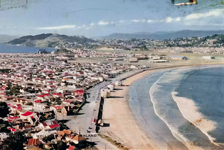 She spent a postgraduate year in Wellington at the New Zealand Library School. There she was viewed by some as "mysterious and secretive", and absented herself on the day when the class photo was taken. A friend thought "there was something from her past she kept well-hidden". At the time she was living in a cottage in Lyall Bay, a Wellington seaside suburb.
She spent a postgraduate year in Wellington at the New Zealand Library School. There she was viewed by some as "mysterious and secretive", and absented herself on the day when the class photo was taken. A friend thought "there was something from her past she kept well-hidden". At the time she was living in a cottage in Lyall Bay, a Wellington seaside suburb.In 1965 she moved back to Auckland, where she worked as a librarian at the Auckland University, while still on parole.
Upon her release from parole in 1965, still only 27, she quit her job at the university and moved away from New Zealand to Britain, where she spent some time in London. By 1966 she was working in the Wandsworth Town library.
 In 1965 Kenric, a new social group for lesbians, was formed in London. It still exists today. According to their website, Hilary Nathan was chair in 1966.
In 1965 Kenric, a new social group for lesbians, was formed in London. It still exists today. According to their website, Hilary Nathan was chair in 1966.The aim of the association was to 'remedy the sense of isolation experienced by many lesbians, by arranging meetings, discussions and other activities' and 'to educate public opinion and improve knowledge on the subject of lesbianism'. It was established as a purely social group.
Kenric paved the way for women's rights movements in the UK, starting in a time where you would still get sacked when you came out publicly as a lesbian.
In the late 1960s, in London, Hilary met Joan who later changed her last name to Nathan by deed poll, to allow the pair to take out a joint mortgage and buy a house together. Joan Nathan maintains in a 1997 newspaper interview (The Guardian - Thursday January 9, 1997) that their friendship is platonic.[Read/download the full article text here]
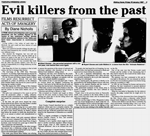 Probably somewhere in the late sixties or maybe the early seventies Hilary retrained as a teacher. In a 1997 article published in Medway News it says that Hilary 'rebuilt a new life as a model of respectability in a village hideaway for the last 30 years. What little is known about Miss Nathan is that she obtained a BA degree at Auckland before training as a librarian and moving to Britain in 1965. She re-trained as a teacher and taught at Abbey Court for 20 years mostly as deputy head before retiring two years ago to run her riding school and care for her 10 horses. Kent County Council described her as a reliable employee whose past was a complete surprise. She had been taken on before police checks were introduced in the late 1970s but would have been recognized by the Department of Education as a suitable teacher.' [Read/download the full article text here]
Probably somewhere in the late sixties or maybe the early seventies Hilary retrained as a teacher. In a 1997 article published in Medway News it says that Hilary 'rebuilt a new life as a model of respectability in a village hideaway for the last 30 years. What little is known about Miss Nathan is that she obtained a BA degree at Auckland before training as a librarian and moving to Britain in 1965. She re-trained as a teacher and taught at Abbey Court for 20 years mostly as deputy head before retiring two years ago to run her riding school and care for her 10 horses. Kent County Council described her as a reliable employee whose past was a complete surprise. She had been taken on before police checks were introduced in the late 1970s but would have been recognized by the Department of Education as a suitable teacher.' [Read/download the full article text here]This clearly suggests that Hilary moved from being a librarian to teaching probably in the late sixties or early seventies. I'd say late sixties, because it matches the long held view that 'The last official reference to Hilary Nathan occurs in February, 1967, when she is reported teaching at an English girls’ school'. And we can safely assume that she moved from London to Kent in that same period.
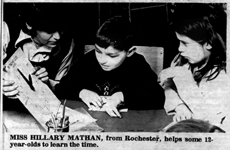
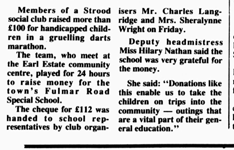 We can however place Hilary Nathan at the Fulmar Road Special School, later Abbey Court special school, in Strood, as early as 1973 (see photo). She taught mentally handicapped children at quickly becoming deputy headmistress. She worked there until her retirement in 1994. Again she absented herself on the day when the class photo was taken. A colleague at her school in Kent noted that the always hung back when photos were being taken. But there are still newspapers photos.
We can however place Hilary Nathan at the Fulmar Road Special School, later Abbey Court special school, in Strood, as early as 1973 (see photo). She taught mentally handicapped children at quickly becoming deputy headmistress. She worked there until her retirement in 1994. Again she absented herself on the day when the class photo was taken. A colleague at her school in Kent noted that the always hung back when photos were being taken. But there are still newspapers photos.
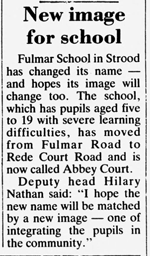 In 1985 Hilary eventually settled in Hoo St Werburgh, in the Medway district of Kent, with her partner Joan 'Jo' Nathan.
In 1985 Hilary eventually settled in Hoo St Werburgh, in the Medway district of Kent, with her partner Joan 'Jo' Nathan.
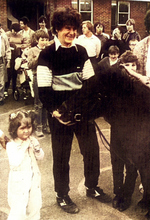
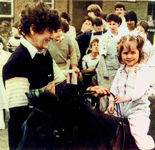




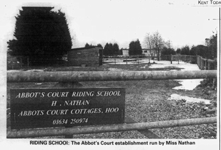
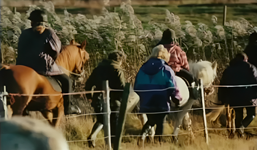
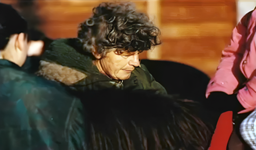 Starting in 1986 she was also running a children's riding school, Abbot's Court Riding School, which boasted ten horses, including an Arab stallion, which were kept in makeshift stables in her tiny backyard and in a field nearby.
Starting in 1986 she was also running a children's riding school, Abbot's Court Riding School, which boasted ten horses, including an Arab stallion, which were kept in makeshift stables in her tiny backyard and in a field nearby.From the web:
"I grew up in Kent not knowing of this crime that took place many years ago. I started horse riding in my village with lots of friends with a lady called Hilary Nathan. We had many great days and weekends in the 9 yrs that I went riding with them. It wasn't until I stopped the horses that the media caught up with Hilary and we all found out what had happened. Hilary was great fun to be around and would do anything for any of us.Unfortunately she moved away when it all came out. ... And for anyone who does think bad of her.....it happened long ago just let her be."
"I too went riding for 3/4 years in Kent with Hilary and she was nothing but kind and thoughtful. She loved her animals , had a wonderful imagination and was highly intelligent. She lived along my road and although people thought that she was somewhat eccentric, she kept herself to herself, gave many of us in the area the chance to ride her horses, a chance that was extremely valuable to me in my life! Which horses did you ride, maybe we rode together? I rode Saul, Theo and Meg as well as my favourite bay whose name I can't remember now, oh and Lady a beautiful Grey. I was a little shocked when everything came to light but to me the Hilary I knew was not the Pauline of the crime and she had paid her price and should be allowed to move on doing the the things she does best working with animals and children."
"I used to go horse riding with Hilary from the age of 8 to 14. When I stopped thats when the media caught up with her and she moved. We lived in Hoo near Rochester and the horses were kept down Abbots Court.The stables were in her back garden. There was about 10 of them. She's a strange lady in a nice way and we went every day after school and all day saturdays and sundays. We had loads of fun. From what I understand she moved to Scotland. ... Those were the best years of growing up for me. It was only today that I went down Abbots Court to see the horses and it hasn't changed much....except Hilary isn't there. Everyone still talks about her. She was a well liked person."
Hilary Nathan had become an anonymous private citizen after her release from prison and she has continued to maintain her anonymity as late as 1997, when a New Zealand reporter found her.
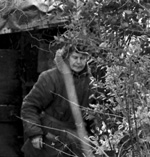

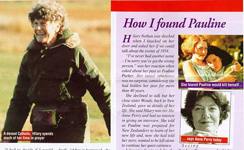
 She was a regular worshipper at English Martyrs' Roman Catholic Church in the town, where members of the congregation were astonished to learn of her past. "It's so difficult to believe," said one woman who did not wished to be named. "She seems like such a good woman. This is a terrible shock to us all".
She was a regular worshipper at English Martyrs' Roman Catholic Church in the town, where members of the congregation were astonished to learn of her past. "It's so difficult to believe," said one woman who did not wished to be named. "She seems like such a good woman. This is a terrible shock to us all".Villagers stated that 58yr old Miss Nathan was a reclusive, devout woman. Diminutive and grey-haired, she does not own a tv, radio or oven and is said to live on a diet of sandwiches and currant buns. A villager said: "She is very eccentric and very much keeps herself to herself. She is very well spoken and appears very intelligent and well educated". In the village of Hoo, one of the few people who knew Hilary Nathan was the librarian who said she spent many hours there reading. A source close to Abbey Court said at the time, "This I know will come as a shock to the whole school. Nobody knew anything about it... She was very much a loner but she was well liked and there were never any problems. But I did notice when school photographs were taken she used to hold herself back out of the picture". Miss Nathan refused to answer questions. "I have absolutely no comment to make," she said. But her sister Wendy, speaking from New Zealand, said, "She has led a good life and is very remorseful for what she's done. She committed the most terrible crime and has spent 40 years repaying it by keeping away from people and doing her own little thing". Parker took five years to realise the enormity of her crime, said Wendy, but now is so repentant she spends most of her time praying. Her next door neighbour, Joyce Hookins, said, She is very quiet and always very business-like in her dealings with people around here. But she has always seemed very nice, and she clearly loves children. She has never said anything to us about her past. We didn't even know she was from New Zealand". Wendy, a year older than Pauline/Hilary, still found it hard to explain why her sister and Juliet lured Mrs Honorah Parker into a Christchurch park and took turns clubbing her to death. "She has never spoken to me about the details of the way she took our mother's life. Well it was absolutely overboard, wasn't it? The story is: they met, they were ill-fated and they committed a dreadful crime".
The mural
 Hilary moved from her house in Hoo around the time 'Heavenly Creatures' was shown nationwide in Britain, according to Peter Graham in his book 'So Brilliantly Clever'. She sold the house to Andrew Ayres with her original art still on the walls of the house! He was looking to by a house around 1997, and went for a viewing of a small cottage in the middle of nowhere: “It was completely covered by ivy and no part of the brickwork could be seen. To the side of the house were many homemade stables and out buildings – it was quite a mess, to say the least!
Hilary moved from her house in Hoo around the time 'Heavenly Creatures' was shown nationwide in Britain, according to Peter Graham in his book 'So Brilliantly Clever'. She sold the house to Andrew Ayres with her original art still on the walls of the house! He was looking to by a house around 1997, and went for a viewing of a small cottage in the middle of nowhere: “It was completely covered by ivy and no part of the brickwork could be seen. To the side of the house were many homemade stables and out buildings – it was quite a mess, to say the least!I knocked on the door and it was opened by a very small and skinny lady. When we went in we couldn’t believe how someone lived in the house in such a humble way. In the front room was a workbench along one wall with many dolls on it. The kitchen just had a sink and very basic cooking instruments indeed, there were a couple of tiny dogs running around that kept getting under your feet, but you could tell they were loved and they loved their owner back. The bedroom where she slept was just a mattress chucked in the corner and nothing else, there was just one lump of coal on the coal fire which didn’t even tackle the cold.
If you were to ask me what I thought of Hilary that would be very simple: she was extremely nice, to the point and maybe a bit eccentric but we connected and things went very easily with the sale. During the sale we had quite a lot of contact and as before I couldn’t have wished for a nicer person.
It was not until we moved in we found out who Hilary was, and in total fairness it never did and never has changed my opinion of her – she was a very nice lady – just a little different. She was very well known in the area, mostly for what she had done but also for the good she did in the community where she showed many children how to ride horses”.
Do check out the Flickr gallery of Pauline Parker/Hilary Nathan's artwork as seen on the walls of her house, see the links-section.
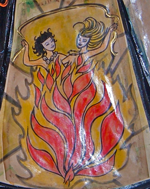
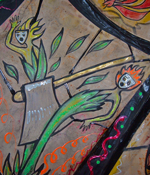
Orkney

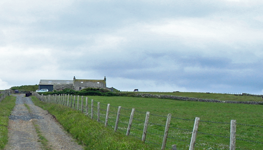 Just before the turn of the century Hilary and Joan moved to Scotland, to the remote Orkney Islands -probably following an old Kenric friend- where Hilary still lives a quiet life today in Burray. Joan has passed away.
Just before the turn of the century Hilary and Joan moved to Scotland, to the remote Orkney Islands -probably following an old Kenric friend- where Hilary still lives a quiet life today in Burray. Joan has passed away. In april 2023, after the death of Anne Perry, The Daily Mail (UK) reported that Hilary Nathan is currently in a hospital.
From that same article:
* Much loved by the tiny community on her remote island of Burray, she has never spoken publicly of her crime, but one close friend told the Mail this week: 'I wish you could meet her. She's amazing. She's an angel.'
* After Pauline arrived in Burray, she was asked by a new friend about the gossip that arrived with her. 'This lady asked her if the rumours were true and she said, 'Yes, it's true about the court case and murder' but she didn't want to talk about it again,' said a Burray islander last week.
* An animal lover with four pygmy goats, three horses and a Chihuahua-toy English terrier, she gave children free riding lessons and has been known to drive with her dog strapped into her car's front seat. She has no TV but loves reading, a friend told the Mail.
* 'She reads most of her literature in French and Italian, never English, because she loves the way those languages sound. She's highly intelligent.'


 In april 2024 the New Zealand Herald published an article about 'Pauline Parker' and among other things it says: It is assumed Pauline remains in her remote island home. There is no record of her death with New Zealand authorities. She will mark her 86th birthday on May 26.
In april 2024 the New Zealand Herald published an article about 'Pauline Parker' and among other things it says: It is assumed Pauline remains in her remote island home. There is no record of her death with New Zealand authorities. She will mark her 86th birthday on May 26.
Sources:
- the Heavenly Creatures F.A.Q.
- Peter Graham, 'Anne Perry and the Murder of the Century' originally published as 'So Brilliantly Clever', 2011
- https://en.wikipedia.org/wiki/Kenric
- https://kenriclesbians.org.uk/about-kenric/the-first-treasurer/
- https://www.dailymail.co.uk/news/article-12026727/How-Anne-Perry-helped-best-friend-batter-mother-death.html
- 'Memories of murder', The Guardian - June 29, 1996
- 'the secret history', The Guardian - Thursday January 9, 1997
- https://www.nzherald.co.nz/nz/heavenly-creatures-murder-teen-killer-pauline-parkers-reclusive-new-life/DLXCBU32WBAWHBJ3GDSPXK7G3M/